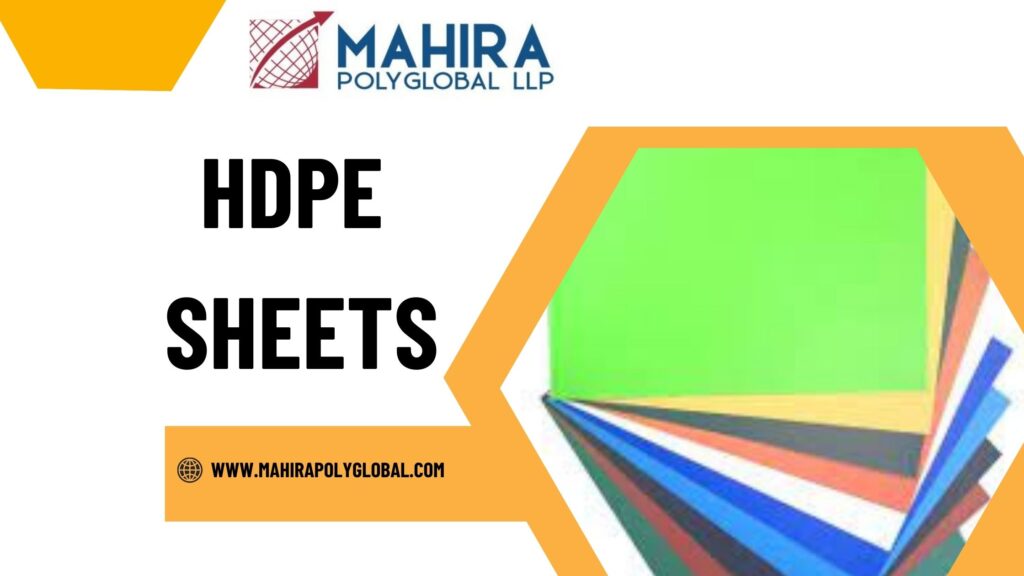
High-Density Polyethylene (HDPE) sheets have become a staple in various industrial and commercial applications due to their unique properties, versatility, and cost-effectiveness. As businesses increasingly seek materials that provide durability, safety, and sustainability, HDPE sheets emerge as a preferred choice across multiple sectors. This article will delve into the reasons behind the widespread use of HDPE sheets, their advantages, and the factors influencing their pricing, with insights from suppliers like Mahira Polyglobal LLP.
Understanding HDPE Sheets
HDPE sheets are made from high-density polyethylene, a type of thermoplastic known for its high strength-to-density ratio. This quality gives HDPE sheets exceptional durability and flexibility, making them suitable for a wide range of applications. These sheets are available in various thicknesses, colors, and finishes, allowing for customization to meet specific needs.
Key Properties of HDPE Sheets
- Durability: HDPE sheets are highly resistant to impact, wear, and tear, making them ideal for environments that require long-lasting materials.
- Chemical Resistance: They are resistant to a broad range of chemicals, including acids and solvents, which is essential for industrial applications.
- UV Resistance: Many HDPE sheets come treated with UV inhibitors, allowing them to maintain their integrity and color when exposed to sunlight.
- Low Moisture Absorption: HDPE sheets have minimal moisture absorption, which helps prevent mold and mildew growth, making them suitable for humid conditions.
- Recyclability: HDPE is 100% recyclable, aligning with contemporary sustainability practices and reducing environmental impact.
- Easy Fabrication: HDPE sheets can be easily cut, drilled, and welded, allowing for flexibility in design and application.
Why HDPE Sheets Are Preferred in Industries
1. Versatility in Applications
HDPE sheets are used in various industries, including:
- Construction: For damp proofing, liners, and protective barriers.
- Agriculture: As greenhouse covers, liners for ponds, and silage covers.
- Food Processing: For food-safe packaging and preparation surfaces.
- Signage: For durable outdoor signs and retail displays.
The versatility of HDPE sheets makes them suitable for multiple sectors, driving their popularity.
2. Cost-Effectiveness
Cost is a critical factor in material selection, and HDPE sheets offer a competitive advantage:
- Longevity: Their durability means fewer replacements and lower maintenance costs over time.
- Efficiency: The ease of fabrication reduces labor costs associated with installation and customization.
In comparison to other materials, the High Density Polyethylene sheet price remains competitive, making HDPE an economical choice for businesses.
3. Safety and Compliance
Safety is paramount in industrial and commercial applications. HDPE sheets are non-toxic and comply with various health regulations, making them suitable for food-related applications. Their chemical resistance also ensures safe handling of hazardous materials in industrial settings, providing peace of mind for businesses and consumers alike.
4. Environmental Sustainability
With increasing emphasis on sustainability, HDPE sheets stand out for their eco-friendly attributes. They are fully recyclable, and many suppliers, including Mahira Polyglobal LLP, focus on producing recycled HDPE products. By choosing HDPE, businesses contribute to reducing plastic waste and promoting sustainable practices in their operations.
5. Customization and Aesthetic Options
HDPE sheets are available in a variety of colors and finishes, allowing businesses to customize them according to branding or design needs. This flexibility makes them an excellent choice for retail displays and promotional materials, providing both functionality and aesthetic appeal.
Pricing Factors for HDPE Sheets
1. Thickness and Size
The Low Density Polyethylene Price in india varies significantly based on thickness and size. Thicker sheets generally cost more due to the increased amount of material used in production. Companies need to assess their specific requirements to determine the best fit.
2. Supplier and Material Quality
Different suppliers may offer varying prices based on the quality of their materials and manufacturing processes. For instance, Mahira Polyglobal LLP is known for its high-quality HDPE sheets, which may come at a premium but offer enhanced durability and reliability.
3. Order Quantity
Bulk orders often lead to reduced prices per unit. Businesses looking to purchase large quantities of HDPE sheets can negotiate better rates with suppliers, making it more cost-effective in the long run.
4. Market Conditions
Economic factors, such as supply chain disruptions or fluctuations in raw material costs, can influence HDPE Sheets Price Companies should stay informed about market trends to make strategic purchasing decisions.
Conclusion
High-Density Polyethylene (HDPE) sheets are the preferred choice for industrial and commercial use due to their unparalleled versatility, cost-effectiveness, safety, and environmental sustainability. As businesses continue to seek materials that can enhance productivity while adhering to sustainability goals, HDPE sheets stand out as a reliable option. By partnering with trusted suppliers like Mahira Polyglobal LLP, companies can access high-quality HDPE sheets tailored to their specific needs, ultimately driving success in their operations. The future of industrial materials is increasingly leaning toward HDPE, making it an essential consideration for forward-thinking businesses
FAQs About HDPE Sheets
Q1: What is HDPE?
HDPE, or High-Density Polyethylene, is a thermoplastic known for its strength, durability, and versatility, commonly used to produce sheets for various applications.
Q2: What are the benefits of using HDPE sheets?
HDPE sheets offer durability, chemical resistance, UV stability, recyclability, and ease of fabrication, making them ideal for a wide range of industrial and commercial applications.
Q3: Are HDPE sheets safe for food contact?
Yes, HDPE sheets are non-toxic and comply with health regulations, making them safe for food packaging and storage.
Q4: What industries commonly use HDPE sheets?
HDPE sheets are widely used in construction, agriculture, food processing, packaging, and signage.
Q5: How do I determine the right thickness for my HDPE sheets?
The appropriate thickness depends on the specific application and the stresses the material will face. Consulting with suppliers can help you make the best choice.
Q6: Can HDPE sheets be recycled?
Yes, HDPE sheets are fully recyclable, contributing to environmentally friendly practices in various industries.
Q7: Where can I purchase high-quality HDPE sheets?
Mahira Polyglobal LLP is a reputable supplier offering a range of HDPE sheets at competitive prices, ensuring you can find the right products for your needs.
Q8: How does the low density polyethylene price in India compare to HDPE sheets?
Low-density polyethylene (LDPE) is typically less expensive than HDPE, but it lacks the strength and durability of HDPE sheets, making them unsuitable for many industrial applications.


